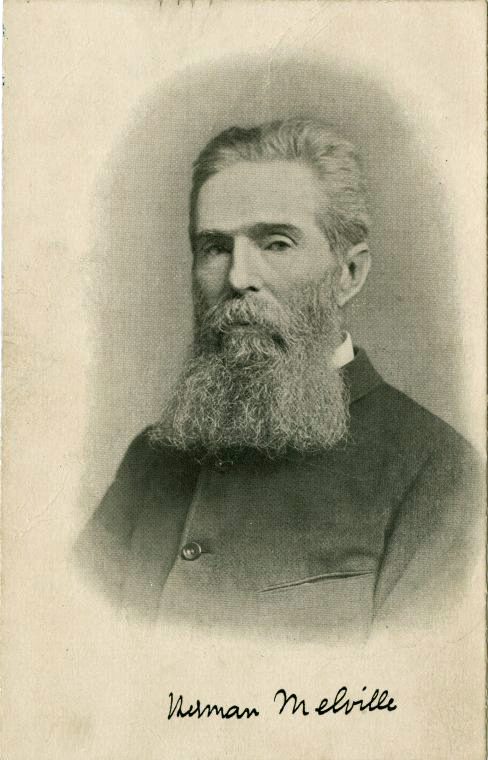"A whale ship was my Yale College and my Harvard." - Herman Melville
The last known image of Melville, 1885
The Writer's Almanac reminds me that on this day - January 2 - in 1841, Herman Melville set sail on the whaler Acushnet from New Bedford, Massachusetts.
Herman Melville was born into an affluent family that had fallen on hard financial times. Becoming a whaler was not on his life plan, but after the death of his father and a fire that wiped out his brother's business, Herman had to leave school to work.
A New Yorker, he tried a variety of things: a job at a bank, less than a month as a lowly merchant mariner (called a "boy") on a voyage to England and back, farming out West, teaching and then again to take to the sea.
In 1841, he went to the whaling port of New Bedford, Massachusetts. He had little experience at sea and no experience at whaling but he was taken on in a lower position on the new whaling ship Acushnet. It was a 359-ton ship with two decks and three masts. It was headed to the Pacific Ocean.
Whaling was lucrative for the owners who sold the prized oil for a high price, but also sold the teeth and bones. Whale oil reigned supreme until 1859 when petroleum was discovered in Pennsylvania. The oil hat came from melting down whale blubber was fuel for household lamps, streetlights, and even lighthouses, and it was one of the most popular lubricants, used in factory machines, sewing machines, and clocks.
Melville would later write about whaling in Moby-Dick, or The Whale and made it sound accurately dangerous and adventurous. He would be in the last generation of men who hunted whales by hand using harpoons up close.
The sperm whale was the preferred target and they could weigh up to 60 tons and grow up to 60 feet long and swam at a speed of 20 knots. They were known to have killed men and destroyed ships during a hunt.
His first whale hunt was off the coast of Brazil in March of 1841. Melville ultimately spent four years at sea and much of his writing would come from that time. He would not have been at first one of the men in the smaller whaleboats that chased and harpooned a whale. But he would have observed that and seen a harpooned whale take the small boat for a "Nantucket sleigh ride" as they continued to harpoon and tire the whale until the dead whale could be towed to the ship. He would have been involved in the laborious and extremely messy process of skinning it on deck.
Melville and shipmate Richard Greene would desert the Acushnet in July 1842 in the Marquesas Islands. Greene would become "Toby" in Melville's first book, Typee. about their time there.
Though we know of his whaling days mostly from Moby-Dick, Melville also wrote about his years at sea in other books. Typee and Omoo were about his time in Polynesia after he had jumped ship. His fourth book, Redburn: His First Voyage, is about being a merchant mariner out of Liverpool, England. It is actually funny in parts and quite different from the heavier Mardi (1848). His time in the U.S. Navy is recounted in White-Jacket (his fifth book)
Though these five books established him as a writer, their sales were not great. The best-selling were the first two tales of the islands and sales dropped with each new book. His sixth book would be the novel is known for but that had poor sales and reviews when it was published.
Along with his own experiences at sea and whaling, Melville was inspired by a number of other books, both fiction and non-fiction. Richard Henry Dana Jr.'s new novel, Two Years Before the Mast and meeting William Henry Chase, the son of Owen Chase, who gave him a copy of his father's account of his adventures aboard the ship Essex and its encounter with a sperm whale are clear influences. An account published in 1839 in an issue of The Knickerbocker magazine of the hunt for a great white sperm whale named Mocha Dick not only influenced Melville to sign on to the Acushnet, but clearly figured into his own novel. Moby-Dick is a novel with inter-chapters that are largely non-fiction about whales and whaling.
The novel sold poorly and Melville would never again be well reviewed in his lifetime and forced to find work other than being a writer in order to pay the bills.
His real fame would come after his death. Though he had trouble publishing his writing after Moby-Dick, modern readers and critics would praise this later work, including stories such as Bartleby the Scrivener, Billy Budd and The Confidence Man. Today, Moby-Dick is considered a very ambitious and great novel though sadly Melville would never know that and never benefit from its continued sales and study.


No comments:
Post a Comment